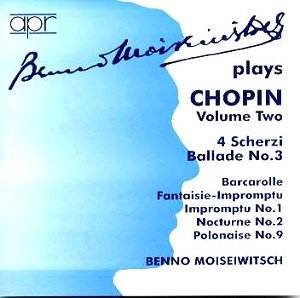Volume Two of APR’s Moiseiwitsch/Chopin series expands
the chronology. The first covered the decade from 1938-48 and the second
volume consolidates Moiseiwitsch’s recordings by including the four
Scherzi – three recorded in 1949 and one, the B flat minor, in 1925.
Similarly the Etudes here date from 1927, the Barcarolle from 1941 and
other recordings later still, from 1952 – the latest of the recordings
here, which cover over a quarter of a century of Moiseiwitsch’s Chopin
playing. A colourist and romantic to his fingertips, with luminous beauty
of tone and the ability to phrase across the bar lines, possessor of
rubati of tremendous deftness, he was a Chopin player, even amongst
a generation of inspired talents, of memorable distinction.
Thus the B minor Scherzo, recorded in 1949, has an
assiduously rarefied reduction of dynamics as well as rhythmic brio,
drama and poetry. The B flat minor shows us that his daring was an indissoluble
part of his romanticism – there is a special animation here but one
that is controlled by exquisite touch and by intellect. His colouristic
primacy can best be heard in the final Scherzo, the one in E. In the
Barcarolle he is fluent, lavishing great beauty of tone, though occasionally
seeming – it’s a matter of degree – slightly rushed. Few complaints
concerning his selection of the Etudes; if some see Moiseiwitsch as
a slightly frivolous and superficial Chopin player the grace, esprit
and drive he cultivates should act as an antidote. The 1927 performance
of the first Impromptu is a real stand out and the E minor Nocturne
is saturated with his translucent beauty of tone and his sovereign command
of tempo rubato. What strikes one, as if anew, listening to this selection
is the generosity he imparts to these works, the arching fluency of
his phrasing and the tonal effulgence he lavishes throughout the unbroken
span of these recordings.
As in the earlier volume the transfers have been carried
out with considerable care and skill; the early electric Scherzo sounds
well and the slightly later 1927 recordings are full of body (primarily
I suppose because American RCA Victor copies were used in preference
to the notoriously noisy black label HMVs). The Etudes are all the more
gratifying to have here because they are the only Moiseiwitsch examples
extant; other performances were rejected and remained unissued.
Jonathan Woolf
